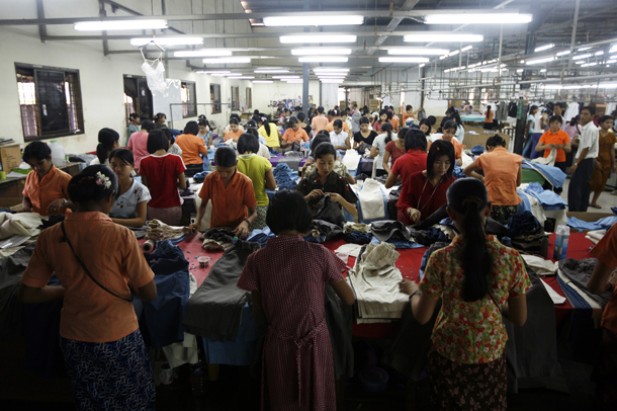Another Wave of Industrial Action Threatens to Drown Burma’s Garment Industry
By Burma Partnership • March 2, 2015 The month of February saw sustained and widespread industrial action at garment factories in Rangoon’s industrial zones, with thousands of striking workers demanding better pay and working conditions. Yet the authorities, along with influential private sector interests, have sought to quell the demonstrations without addressing the fundamental flaws in this burgeoning sector, resorting to force and underhand methods as they have done for decades.
The month of February saw sustained and widespread industrial action at garment factories in Rangoon’s industrial zones, with thousands of striking workers demanding better pay and working conditions. Yet the authorities, along with influential private sector interests, have sought to quell the demonstrations without addressing the fundamental flaws in this burgeoning sector, resorting to force and underhand methods as they have done for decades.
The main strikes occurred at E-Land Myanmar, Costec, Tai Yi, Red Stone and Ford Glory factories, located in Shwepyithar and Hlaingtharyar industrial zones. While there are variations in demands across the factories, one which was consistent among the strikers was a pay increase of 30,000 kyat ($30) per month. The average wage of a worker in a garment factory in Rangoon is around 80,000 ($80) per month. This is not a living wage and barely enough to survive, while a complex system of overtime and bonuses means that basic wages are extremely low, thus forcing workers to work an extra three hours per day, as well as on weekends, to make ends meet.
The response of the authorities to the thousands of striking workers has been repressive. Two union leaders were arrested and detained in Insein Prison, police used excessive force to break up protests on 20 February, injuring dozens, while in a statement, the Rangoon Division Government warned against strike action, threatening legal proceedings, as did the Ministry of Labour. The Myanmar Garment Manufacturer’s Association (MGMA) threatened the loss of jobs with no compensation if strikes were to continue, while special branch officers, the intelligence arm of the government, have been active in the demonstrations, posing as journalists and taking photographs of the workers. Despite negotiations, the issues remains unresolved, as more workers have returned to their place of work, and the factories have re-opened. It is also alleged that the embassies of the South Korean and Chinese governments pressed the Burma Government to do more to forcibly end the strikes, as the factories involved were of part South Korean and Chinese ownership.
It appears that while the authorities and the private sector have gained a short-term victory, unless the fundamental rights of workers are respected, more industrial action will occur as workers continue to be exploited and will continue to resist. Since 2011, the industrial zones in Rangoon have seen various waves of strikes yet the fundamental issues around workers’ demands have simply not been addressed. Flaws in legislation enacted in 2012 that ostensibly allows unions to be formed and a system to settle employment disputes mean that the legislation is heavily skewed in the favour of employers and does not guarantee good-faith bargaining. Furthermore, the continued intimidation and persecution of labor rights activists and union leaders by government authorities is a flagrant breach of fundamental rights to freedom of assembly, association and expression, as protected under international law.
The recently announced voluntary code of conduct ratified by the MGMA seeks to ensure that international best practices are adhered to by employers. Yet this code is only voluntary, and furthermore, was drawn up by the private sector itself, rather than in consultation with the people who are suffering the terrible working conditions in the industry. As Alex Moodie, Research and Advocacy officer at Burma Partnership points out, “What is needed is a structural shift, including stronger legislation and enforcement by the government that ensures good-faith bargaining. Otherwise, the worst offenders in the garment industry will simply carry on with their terrible employment practices and factory workers will continue to suffer.” This suffering is exactly what we have seen this past month.
It is not enough to rely on the employers themselves to ensure the rights of workers are protected. Fundamental legal reforms must occur to offer effective protection to those who demand better pay and working conditions as well as the freedom to form unions and to protest peacefully. Foreign investors who are, or are considering, investing in the industrial zones in Burma need to realize that the Burma authorities and their local partners are not bound by domestic law to protect the workers who make the clothes and shoes that people in South Korea, Japan, China, the EU and the US can afford to buy so cheaply. And so these international investors and buyers also have a duty to ensure that human rights are observed in their supply chains.
Yet while there is no binding legislation, international standards such as the UN Guiding Principles on Business and Human Rights establish the duty of governments to protect human rights and the responsibility of businesses to respect them. It is these principles that should provide the foundation for policies and procedures within Burma’s nascent garment industry, rather than legal threats, police attacks, and other tools of intimidation against those people who stand up for their fundamental rights.
Tags: Burma Partnership, Garment Industry, Myanmar Garment Manufacture's Association, UN Guiding Principles on Business and Human RightsThis post is in: Blog
Related PostsBurma Partnership Celebrates Continuing Regional Solidarity for Burma and Embraces the Work Ahead for Progressive Voice
Burma Army Displays Blatant Disregard for 21st Century Panglong Peace Process
Ann Din Coal Power Plant: Local Movement and Action to Preserve and Protect Natural Resources and Land: Mon IDP Report Case Study #4
Latest Human Rights Abuse Case Demonstrates Urgent Need to Reform the Myanmar National Human Rights Commission
Human Rights Far From Guaranteed as US Sanctions on Burma Are Removed









 All posts
All posts